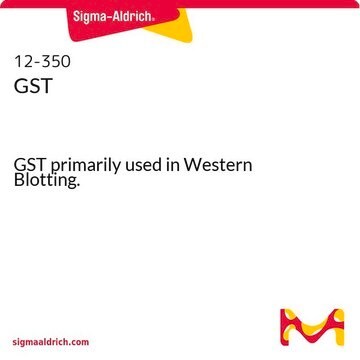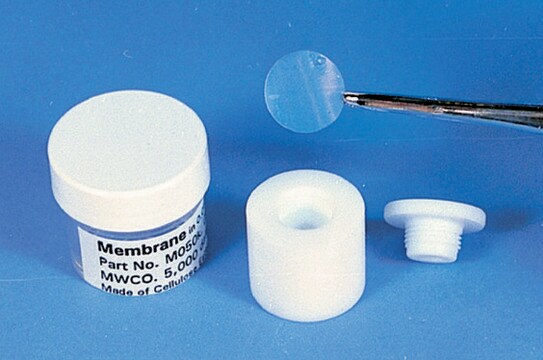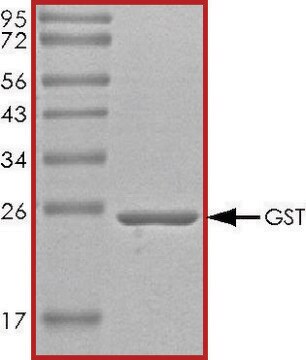GS64
GST A4-4, Recombinant Human
Synonym(s):
GTA4, glutathione S-transferase alpha 4
Sign Into View Organizational & Contract Pricing
All Photos(1)
About This Item
UNSPSC Code:
12352200
NACRES:
NA.26
Recommended Products
biological source
human
Quality Level
recombinant
expressed in E. coli
Assay
>95% (SDS-PAGE)
form
frozen liquid
specific activity
3.68 units/mg protein
mol wt
25 kDa
concentration
1.01 mg/mL
storage temp.
−70°C
Gene Information
human ... GSTA4(2941)
General description
using spectrophotometric determination of 1-chloro-2,4-dinitrobenzene (CDNB) conjugation with reduced glutathione (1 mM) in 100 mM NaPO4 (pH 6.5) at room temperature.
Biochem/physiol Actions
Glutathione S-transferase alpha 4 (GSTA4) is an enzyme that in humans is encoded by the GSTA4 gene. Glutathione S-transferases (GSTs) are a family of enzymes that play an important role in detoxification by catalyzing the conjugation of many hydrophobic and electrophilic compounds with reduced glutathione. Based on their biochemical, immunologic, and structural properties, cytosolic and membrane-bound forms of glutathione S-transferase are encoded by two distinct supergene families. At present, eight distinct classes of the soluble cytoplasmic mammalian glutathione S-transferases have been identified: alpha, kappa, mu, omega, pi, sigma, theta and zeta. The GSTs are thought to function in xenobiotic metabolism and play a role in susceptibility to cancer, and other diseases.
This gene encodes a glutathione S-tranferase belonging to the alpha class. The alpha class genes, which are located in a cluster on chromosome 6, are highly related and encode enzymes with glutathione peroxidase activity that function in the detoxification of lipid peroxidation products. Reactive electrophiles produced by oxidative metabolism have been linked to a number of degenerative diseases including Parkinson′s disease, Alzheimer′s disease, cataract formation, and atherosclerosis.
Storage and Stability
The enzyme should be used by the end-user customer within 1 year of receipt.
Storage Class Code
10 - Combustible liquids
WGK
WGK 1
Flash Point(F)
Not applicable
Flash Point(C)
Not applicable
Certificates of Analysis (COA)
Search for Certificates of Analysis (COA) by entering the products Lot/Batch Number. Lot and Batch Numbers can be found on a product’s label following the words ‘Lot’ or ‘Batch’.
Already Own This Product?
Find documentation for the products that you have recently purchased in the Document Library.
Yongzhen Yang et al.
Toxicology and applied pharmacology, 230(2), 187-196 (2008-05-20)
Our recent work in endothelial cells and human atherosclerotic plaque showed that overexpression of glutathione-S-tranferases (GSTs) in endothelium protects against oxidative damage from aldehydes such as 4-HNE. Nuclear factor (NF)-kappaB plays a crucial role during inflammation and immune responses by
Larissa M Balogh et al.
Biochemistry, 49(7), 1541-1548 (2010-01-21)
Conjugation to glutathione (GSH) by glutathione transferase A4-4 (GSTA4-4) is a major route of elimination for the lipid peroxidation product 4-hydroxynonenal (HNE), a toxic compound that contributes to numerous diseases. Both enantiomers of HNE are presumed to be toxic, and
Kaname Uno et al.
Molecular carcinogenesis, 50(10), 781-790 (2011-07-14)
Oxidative stress might participate in the carcinogenesis of human esophageal squamous cell carcinomas (hESCC). 4-Hydroxynonenal (HNE) is a major product of membrane lipid peroxidation with short life. It might act as an important mediator through the generation of adducts and
Fabio Coppedè et al.
Mutation research, 579(1-2), 107-114 (2005-08-02)
Several lines of evidence, including an increased level of lipid peroxidation and the depletion of antioxidant molecules like as glutathione (GSH), indicate that oxidative stress plays an important role in the pathogenesis of several neurodegenerative disorders, such as Parkinson's disease
Ji Qian et al.
Molecular carcinogenesis, 48(3), 253-259 (2008-09-04)
GST Alpha 4 (GSTA4) has an important role in the protection against oxidative stress induced by carcinogens such as tobacco smoke. However, few studies investigated the association between GSTA4 polymorphisms and lung cancer risk. We genotyped three selected GSTA4 SNPs
Our team of scientists has experience in all areas of research including Life Science, Material Science, Chemical Synthesis, Chromatography, Analytical and many others.
Contact Technical Service







